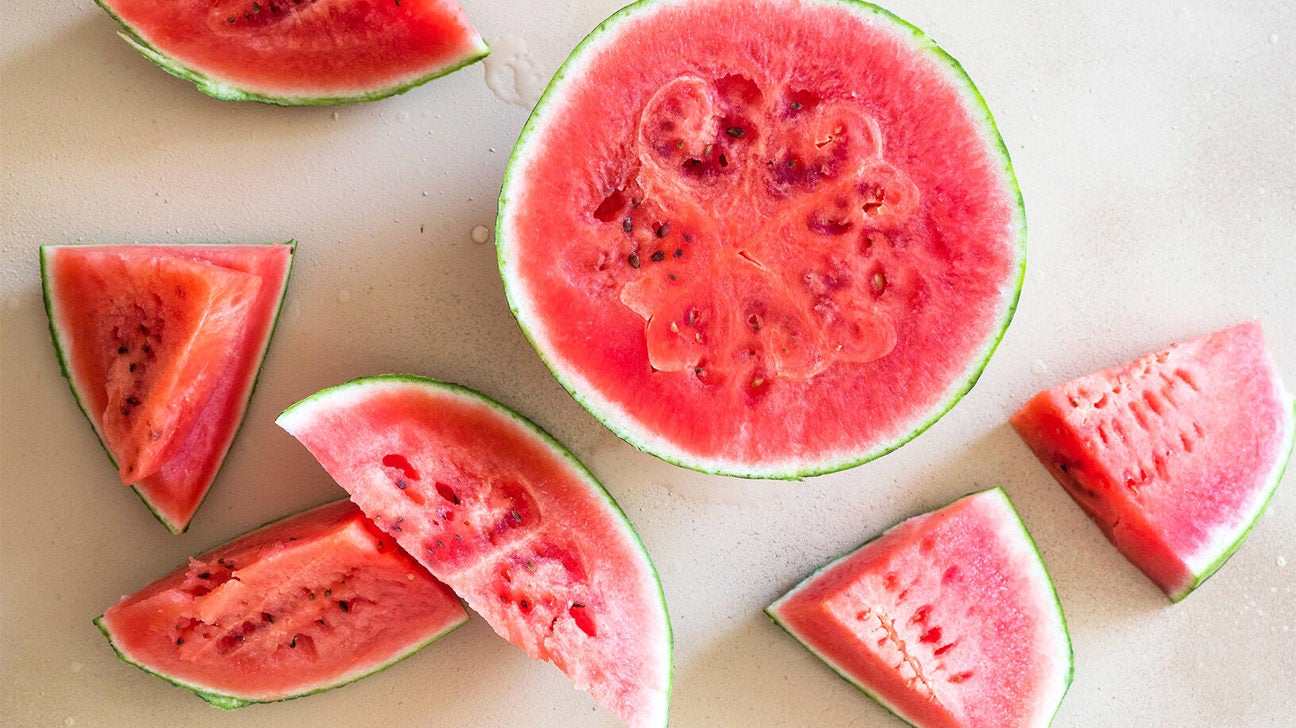
- A new study suggests that eating watermelon may be better for you than previously believed.
- Researchers found that study participants who ate more watermelon had a greater intake of essential nutrients, including fiber, potassium, and vitamin C.
- Watermelon can also help improve hydration and lower your risk of heart disease.
Watermelon may be even more nutritious than previous research suggests.
According to a new study published in Nutrients, eating watermelon could actually help increase total nutrient intake and diet quality.
The study authors analyzed data from National Health and Nutrition Examination Survey (NHANES) cycles 2003–2018. They found people who consumed watermelon had a greater intake of essential nutrients including dietary fiber, magnesium, potassium, vitamin C, and vitamin A, as well as lycopene and other carotenoids.
This suggests watermelon can increase nutrient intake as well as diet quality in both children and adult Americans, say the study authors.
These findings are similar to previous studies which have shown eating fruit in general contributes to nutrient intake, but other studies have lacked looking at watermelon specifically.
People from the data analysis who consumed watermelon also had lower intakes of added sugars and total saturated fatty acids.
Kristen Fulgoni, research analyst and study author, is presenting the research findings at the American Society for Nutrition annual meeting, Nutrition 2023, held July 22-25 in Boston.
General watermelon nutrition information
Watermelon is full of water, is nearly fat-free, and is a source of essential vitamins and minerals. Eating watermelon is associated with the following health benefits:
- Lower blood pressure
- Reduced insulin resistance
- Reduced muscle soreness (quicker rebound)
Watermelon benefits are also linked to better digestion, improved skin health, and lower levels of inflammation.
The nutrients in 2/3 cup (100 grams) of raw watermelon according to the USDA are:
- Calories: 30
- Water: 91%
- Protein: 0.6 grams
- Carbs: 7.6 grams
- Sugar: 6.2 grams
- Fiber: 0.4 grams
- Fat: 0.2 grams
Watermelon also has heart health benefits
“Watermelon is a fruit that offers a great way to help you stay hydrated (with its large water content), and rich in vitamins C, magnesium, calcium, and potassium,” says Kristin Kirkpatrick, MS, RDN, a nutritionist and the author of “Skinny Liver.”
“It also is low on the glycemic load, which offsets the idea that eating watermelon will lead to extreme spikes in blood sugar and insulin,” Kirkpatrick explains.
Specifically, though, she links the heart health benefits of watermelon to lycopene, a plant-based antioxidant.
Lycopene is the nutrient that gives the pink or red pigment to certain fruits.
Research suggests lycopene is associated with lowering your risk of developing heart disease or prematurely dying from heart disease.
The USDA says studies have shown that a cup and a half of watermelon contains about 9 to 13 milligrams of lycopene. So on average watermelon contains some 40% more lycopene than tomatoes, says Kirkpatrick after citing the report.
“It’s also high in an amino acid known as citrulline,” Kirkpatrick adds. Citrulline has become popular as an exercise supplement as it can dilate blood vessels and may promote muscle growth.
Julie Cunningham, a registered dietitian and diabetes educator, also brings up citrulline or L-citrulline which is the naturally occurring form. “Watermelon is an especially good source of L-citrulline, a substance that researchers have found lowers blood pressure and helps prevent clogging of the arteries,” she says.
Easy ways to add watermelon to your diet
Kirkpatrick shared the following tips to help incorporate more watermelon into your diet.
- Replace very high-sugar desserts with watermelon. “For example, having a cup of watermelon instead of ice cream will provide more nutrient density,” says Kirkpatrick.
- Bring watermelon as a snack during activities. “Snacking on watermelon during a hike will help with hydration,” she says.
- Freeze watermelon and make slushies.
- Add watermelon to salads. “Grilled watermelon slices go well on arugula salads,” Kirkpatrick says.
Cunningham is also a fan of adding watermelon to salads.
“Cold watermelon salad makes a great summer side dish,” she says. “Just mix cubed watermelon, chopped cucumbers, crumbled feta cheese, and fresh basil and mint leaves,” she says.
Then, it’s not necessary but recommended to refrigerate for several hours ahead of time.
“If you want to go a little more fancy, dress with honey and lime juice,” says Cunningham.
“Watermelon also makes a great salsa when mixed with mango, red onion, jalapeno, lime, and cilantro. Serve with chips or over chicken or fish at a meal,” Cunningham suggests.
More foods you can try to boost your nutrition
Healthy eating doesn’t begin and end with watermelon. There are many other fresh foods that contain similar nutrient profiles that can be easily added to your diet.
For example, Cunningham says while watermelon is a good source of lycopene, so are the following:
- tomatoes
- papaya
- guava
- pink grapefruit
- sweet red peppers
If you’re not sure when shopping what foods have heart-healthy lycopene, look for color.
“Foods with a strong red color tend to be high in lycopene,” Cunningham tells Healthline.
Kirkpatrick agrees saying that watermelon is just one plant, however eating a variety of fruits and vegetables may also assist with heart health.
In addition to eating watermelon, then, Kirkpatrick recommends considering incorporating more healthy fats (like nuts, seeds, and extra virgin olive oil) as well as fiber-rich foods, such as beans and legumes and doing your best to maintain or reach a low intake of added sugar, refined grains, and fried foods.
Want to Lower Your Risk of Heart Disease? Try Eating Watermelon
Source: Pinoy Lang Sakalam



0 (mga) komento:
Mag-post ng isang Komento